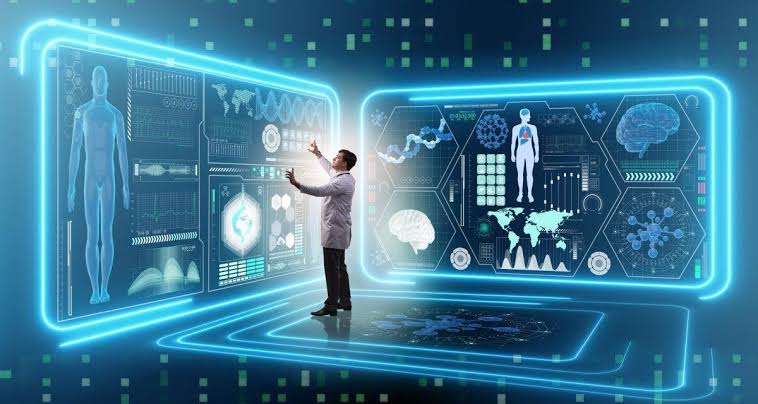Artificial Intelligence on Business & Healthcare has sparked a remarkable revolution. What once served as a simple search tool is now deeply integrated into major corporations and healthcare facilities worldwide, transforming industries with its advanced capabilities.”
This version maintains clarity while ensuring the keyphrase is present in a natural flow. Let me know if you’d like further refinements!
AI in Everyday Healthcare and Business
AI plays a crucial role in modern healthcare, assisting with research development, drug interaction alerts, and online appointment bookings. In the business sector, artificial intelligence enhances operations through technologies such as computer vision, natural language processing, and machine learning. These applications boost productivity and create value for companies.
Artificial Intelligence in Businesses
1. Marketing and Sales
AI automates various tasks, freeing up sales representatives to engage with potential customers. Tasks such as quick responses, data entry, A/B testing, and meeting scheduling are streamlined. Additionally, AI customizes coaching suggestions and training materials, ensuring that sales teams develop the necessary skills.
2. Predictive Analytics
AI-driven predictive analytics leverages statistical analysis and machine learning to identify trends and anticipate future behaviors. Businesses use this technology to forecast events, assess risks, and prevent potential setbacks. Tools such as Salesforce Einstein, an AI-powered customer relationship management (CRM) system, support these efforts.
3. Fraud Detection
AI significantly reduces the likelihood of fraud by identifying unusual patterns and behaviors that might otherwise go unnoticed. Payment systems can automatically detect and prevent fraudulent activities in real time using predictive analytics, minimizing financial losses. As AI capabilities advance, businesses benefit from enhanced security measures.
Artificial Intelligence in Healthcare
1. Patient Monitoring
AI-powered systems analyze patient data during remote monitoring, detecting subtle variations in vital signs that may indicate potential health risks. This technology allows healthcare professionals to receive timely alerts, enabling early intervention and improved patient outcomes.
2. Robot-Assisted Surgery
AI-driven robotic exoskeletons aid in rehabilitation following injuries or illnesses. Additionally, robotic systems assist surgeons with precision-based procedures. AI also accelerates medical research and drug development by analyzing diagnosis and treatment plans. One example is the Da Vinci Surgical System, an AI-assisted robotic surgery tool.
3. Treatment Plans
AI algorithms generate vast amounts of data to create personalized treatment plans. By considering genetic composition, medical history, lifestyle, and treatment responses, AI suggests customized therapies that enhance effectiveness while minimizing side effects. An example of such technology is Tempus, an AI-powered precision medicine platform.
Read The Best AI Tools and Apps: Revolutionizing Everyday Tasks
Conclusion
Andrei Kasyanau once stated, “Although generative AI has captured headlines in recent years, many companies have opted to invest more in predictive AI applications. These technologies are often more directly beneficial to business outcomes and operational efficiency.” Simply put, AI represents the future of business and healthcare by driving growth and efficiency.
What’s Your Favorite AI Tool?
Are you ready to step into the future
 Ricki Malatji
skilled content writer who creates engaging, SEO-friendly articles on diverse topics. With a talent for simplifying complex ideas, [Your Name] delivers clear, impactful content that connects with readers. Passionate about storytelling and staying ahead of trends, [Your Name] thrives on crafting pieces that inform and inspire.
LinkedIn
Ricki Malatji
skilled content writer who creates engaging, SEO-friendly articles on diverse topics. With a talent for simplifying complex ideas, [Your Name] delivers clear, impactful content that connects with readers. Passionate about storytelling and staying ahead of trends, [Your Name] thrives on crafting pieces that inform and inspire.
LinkedIn
